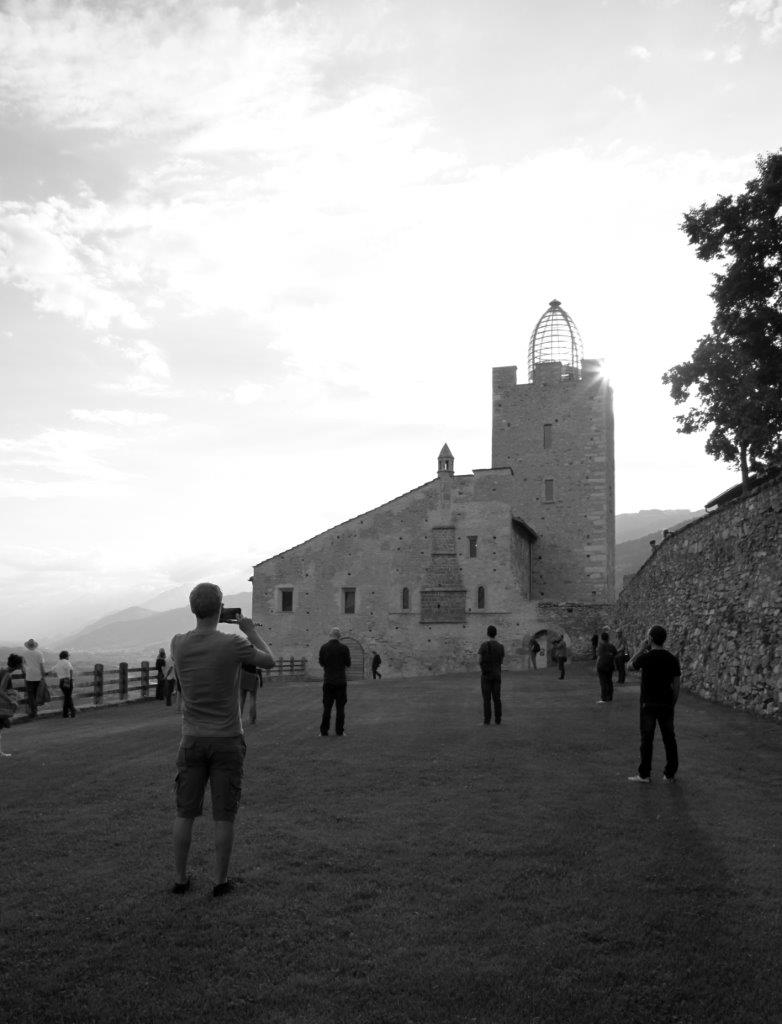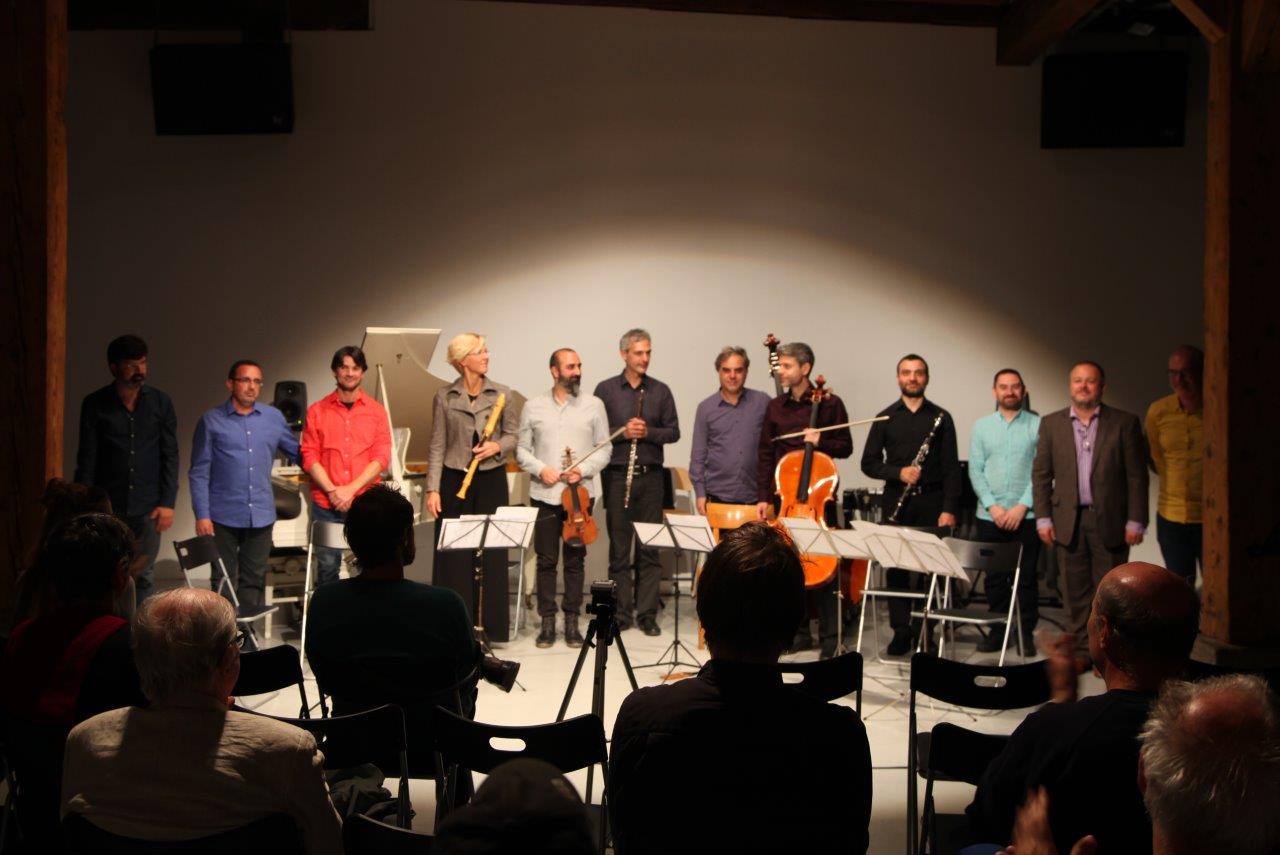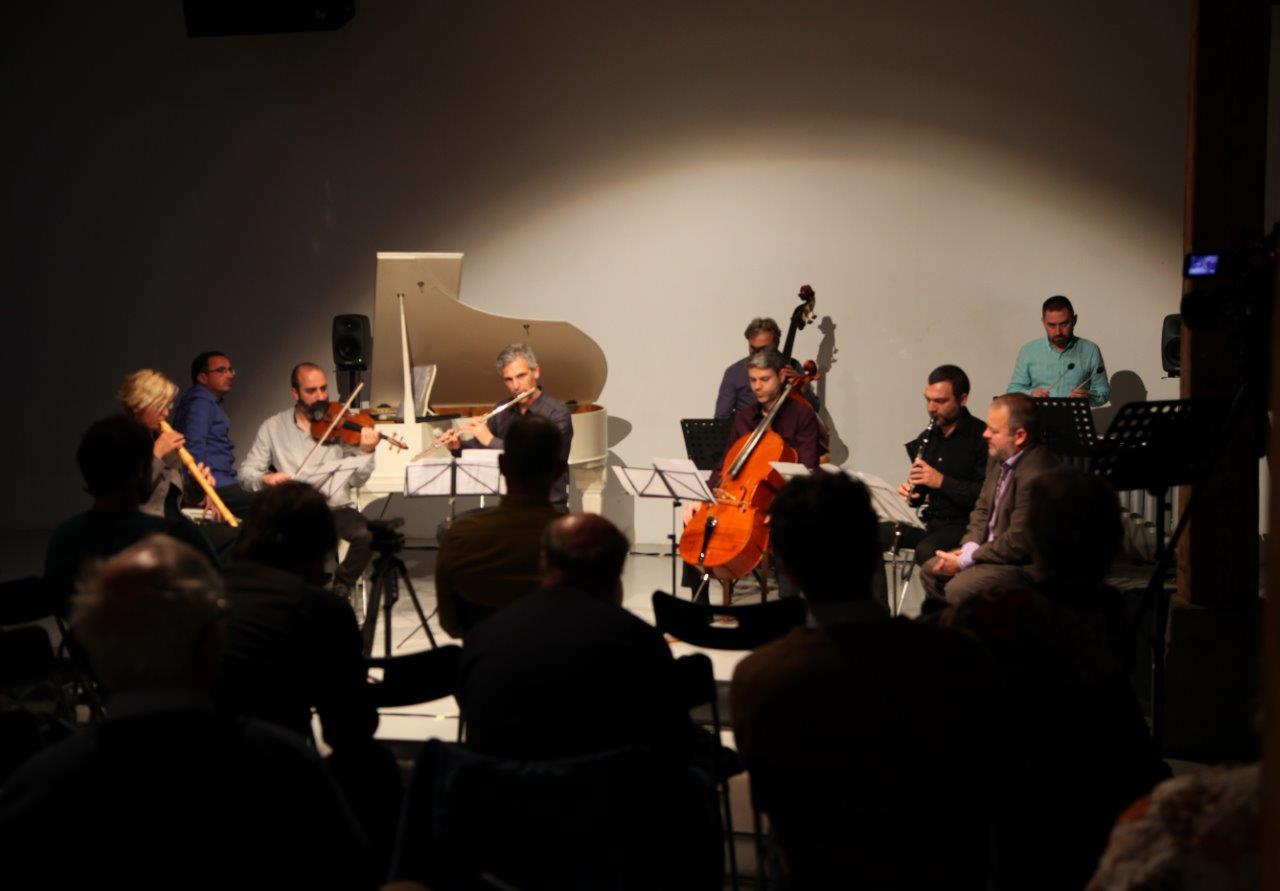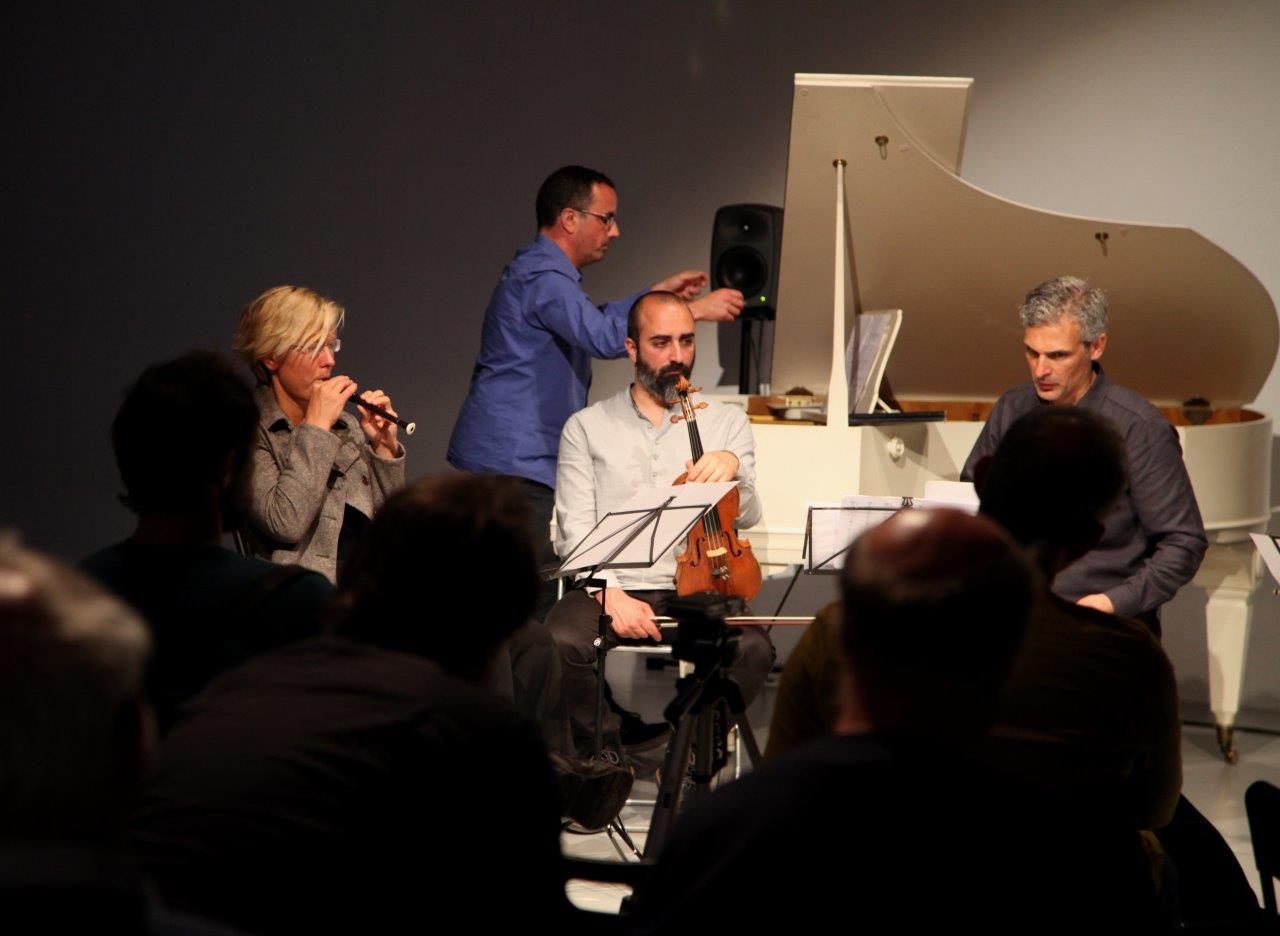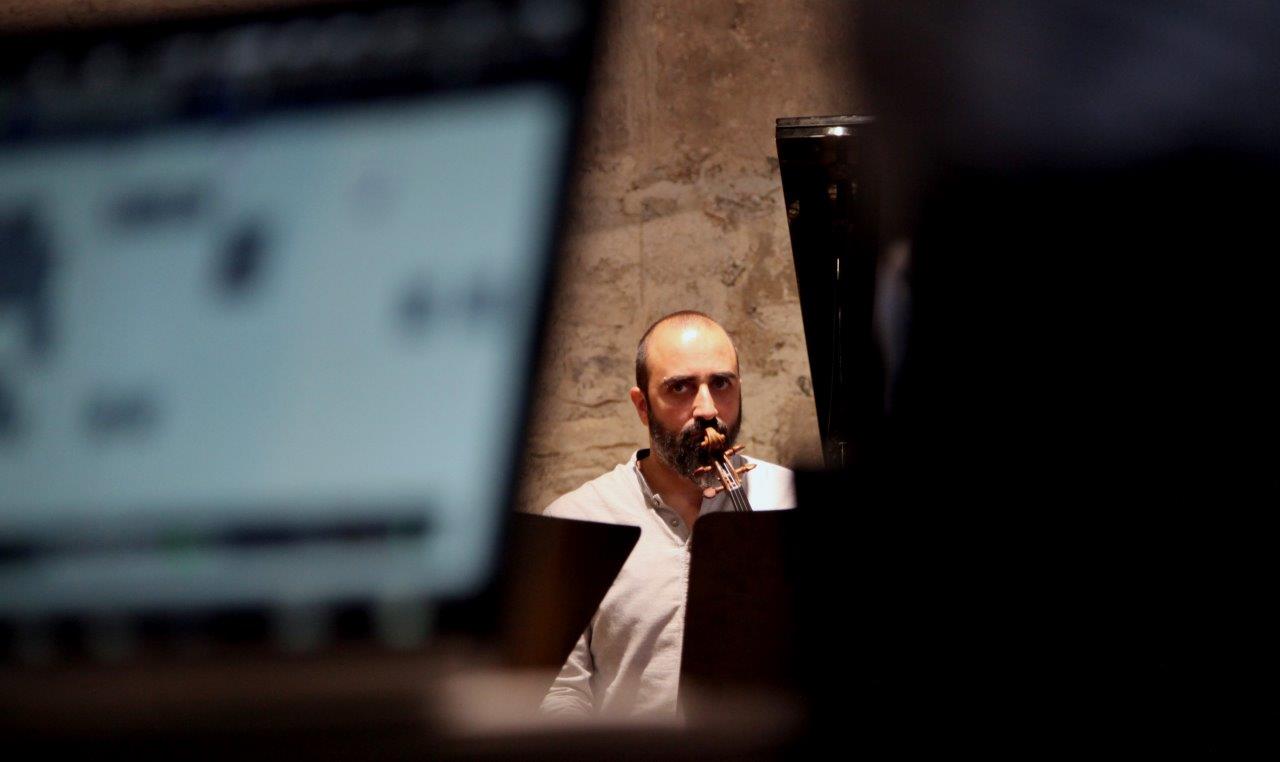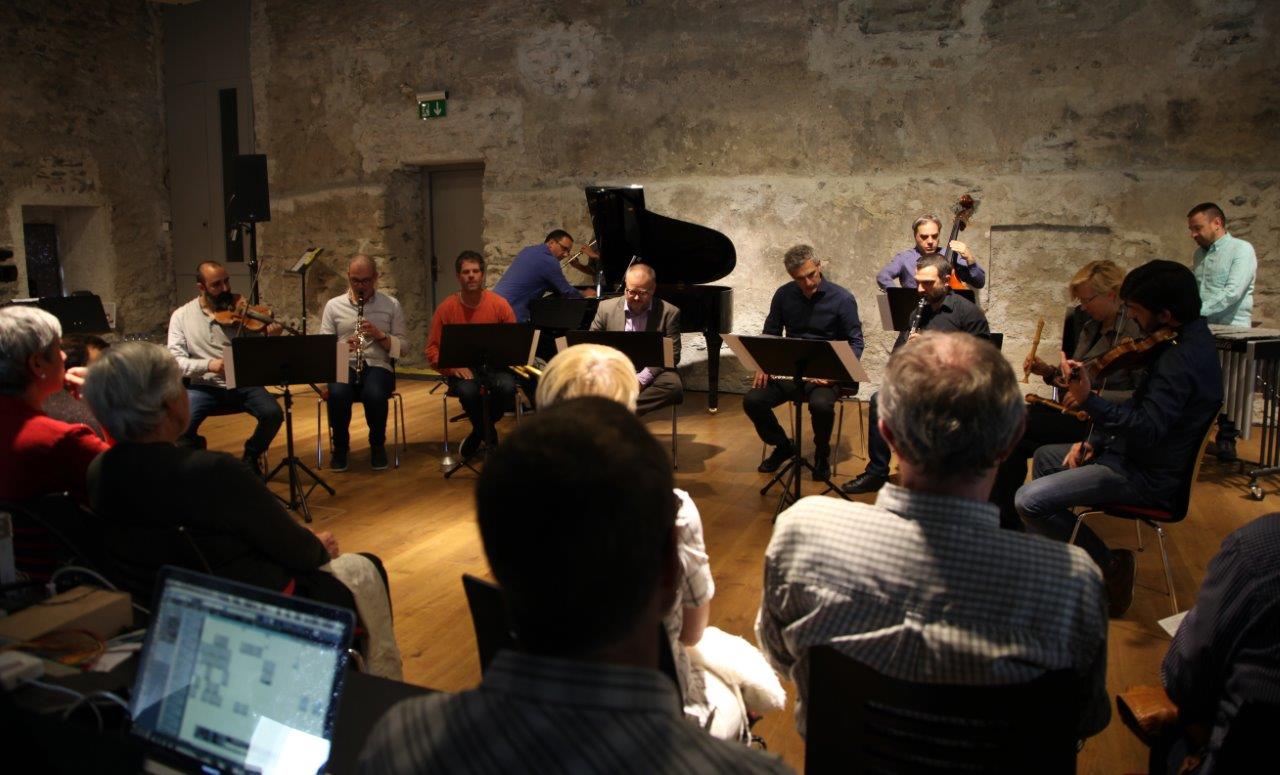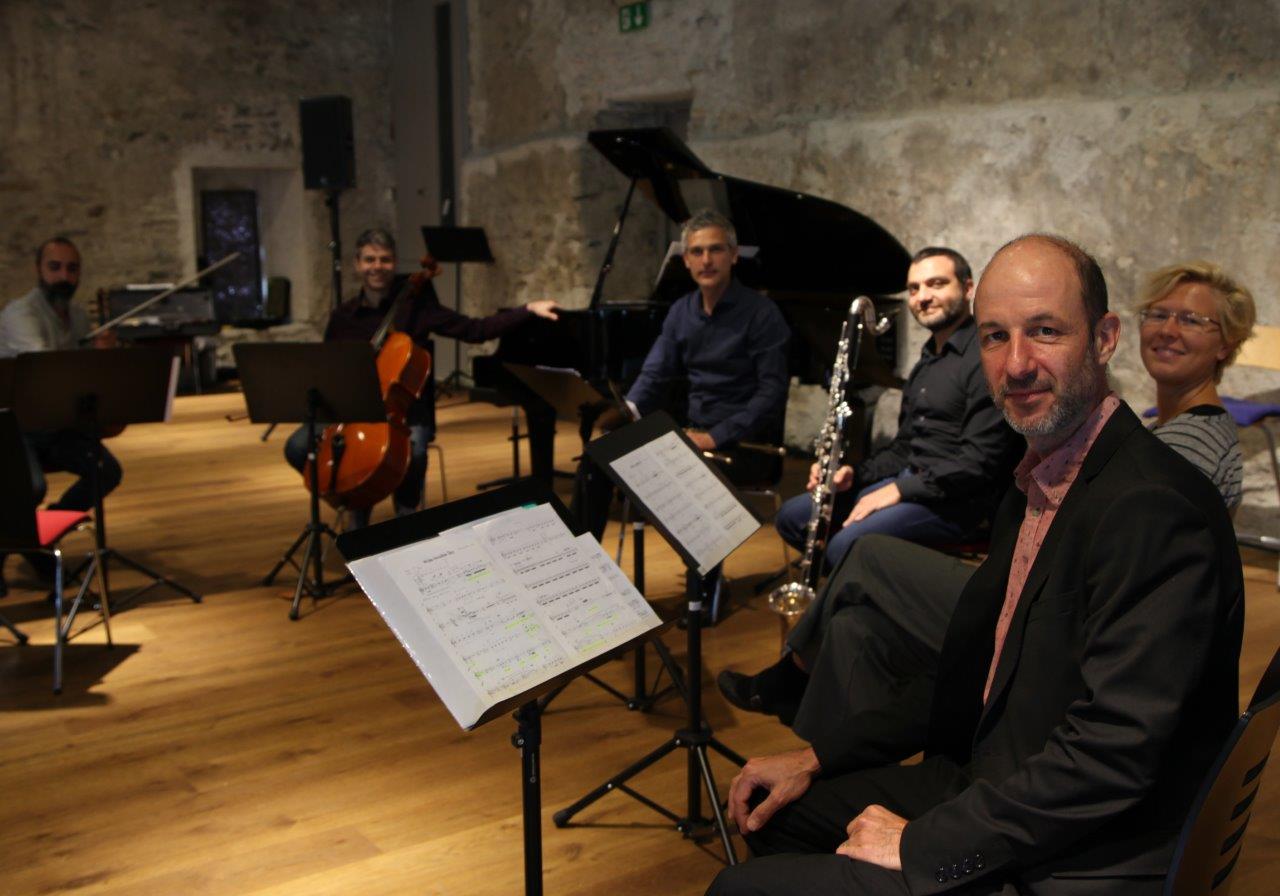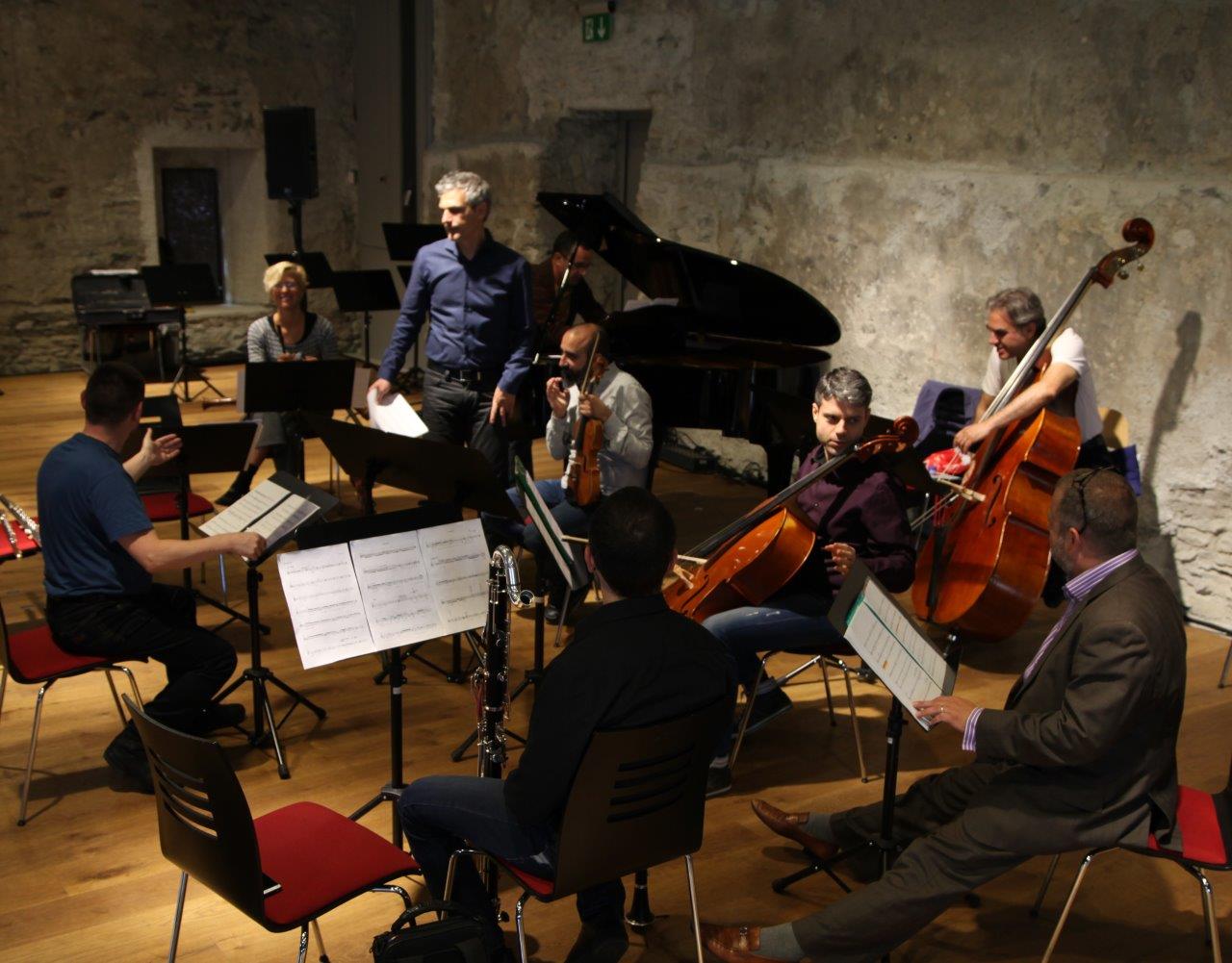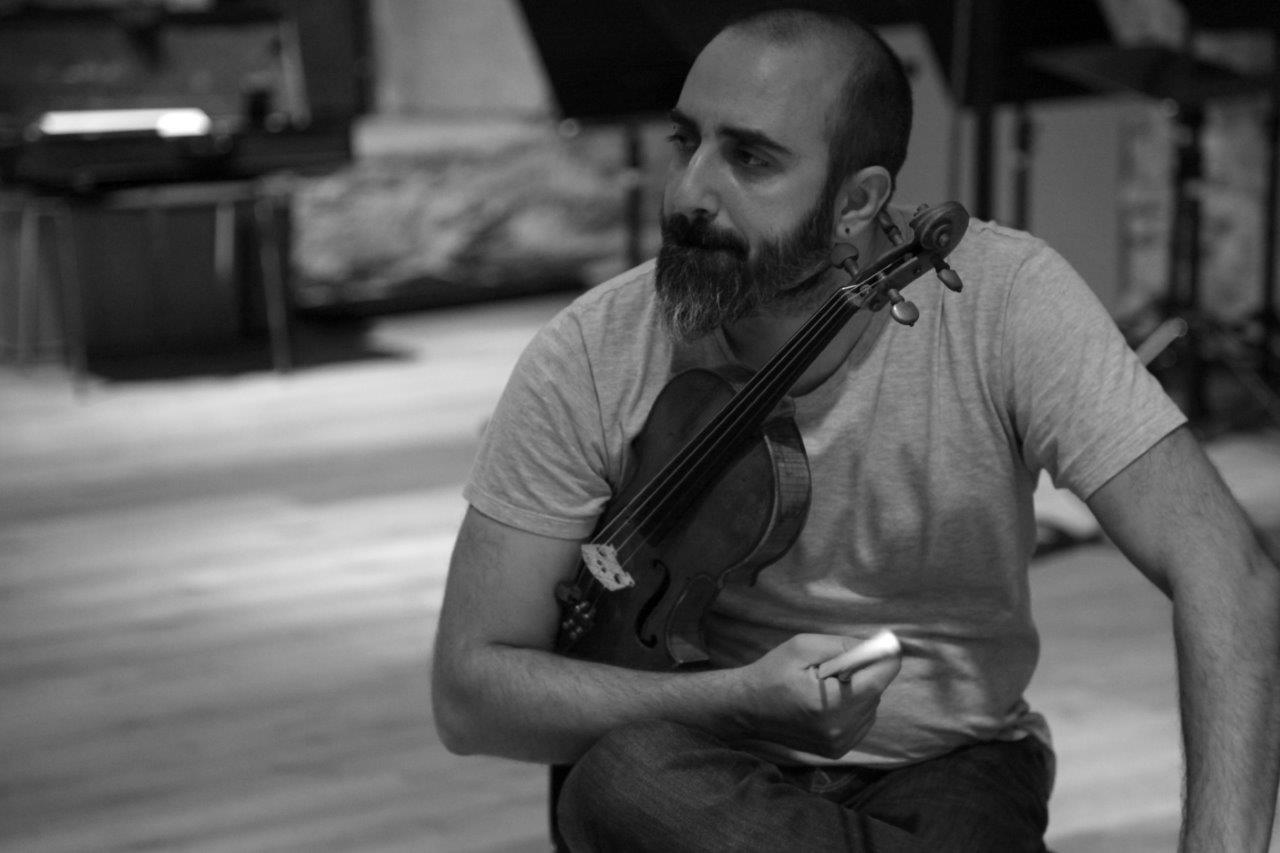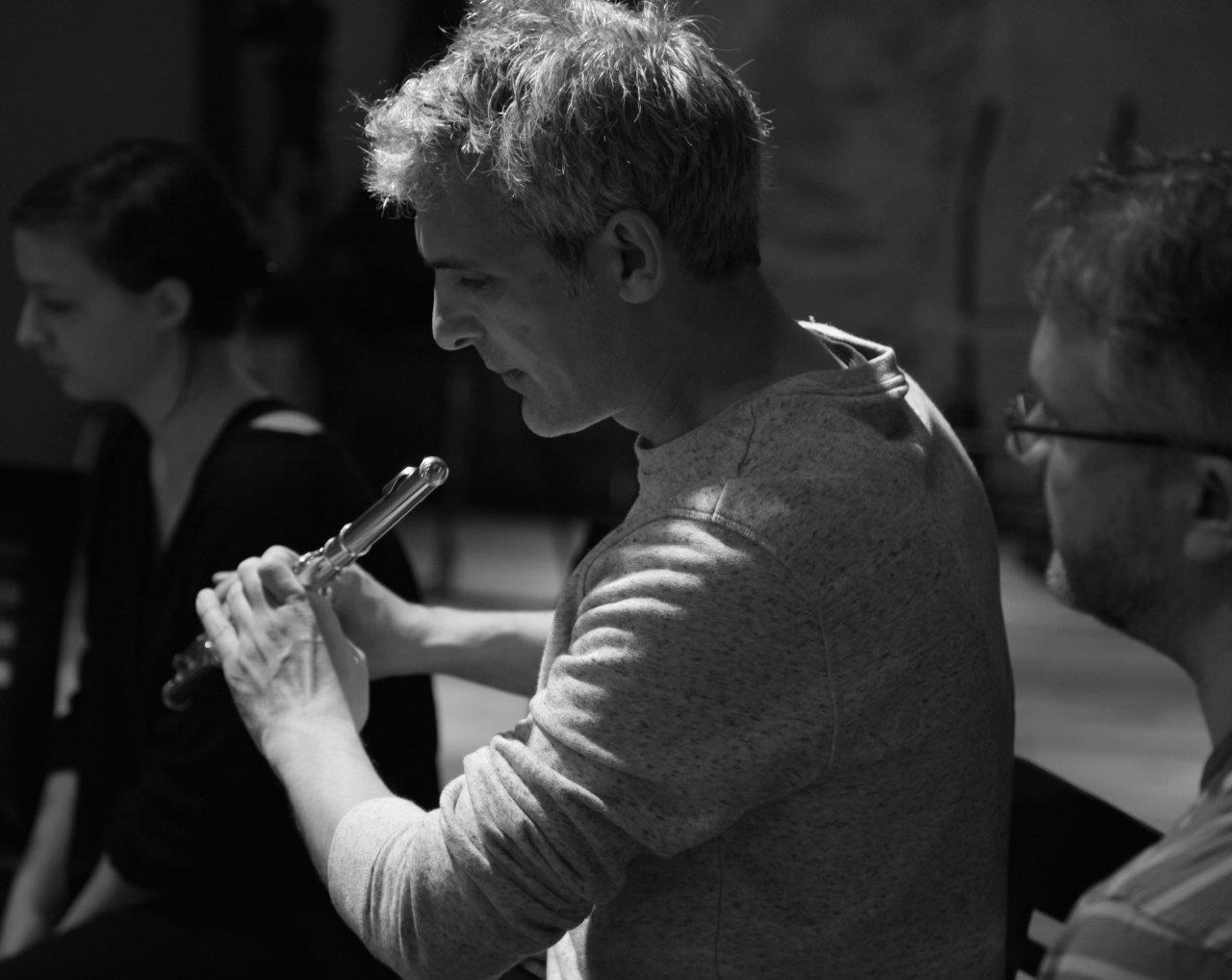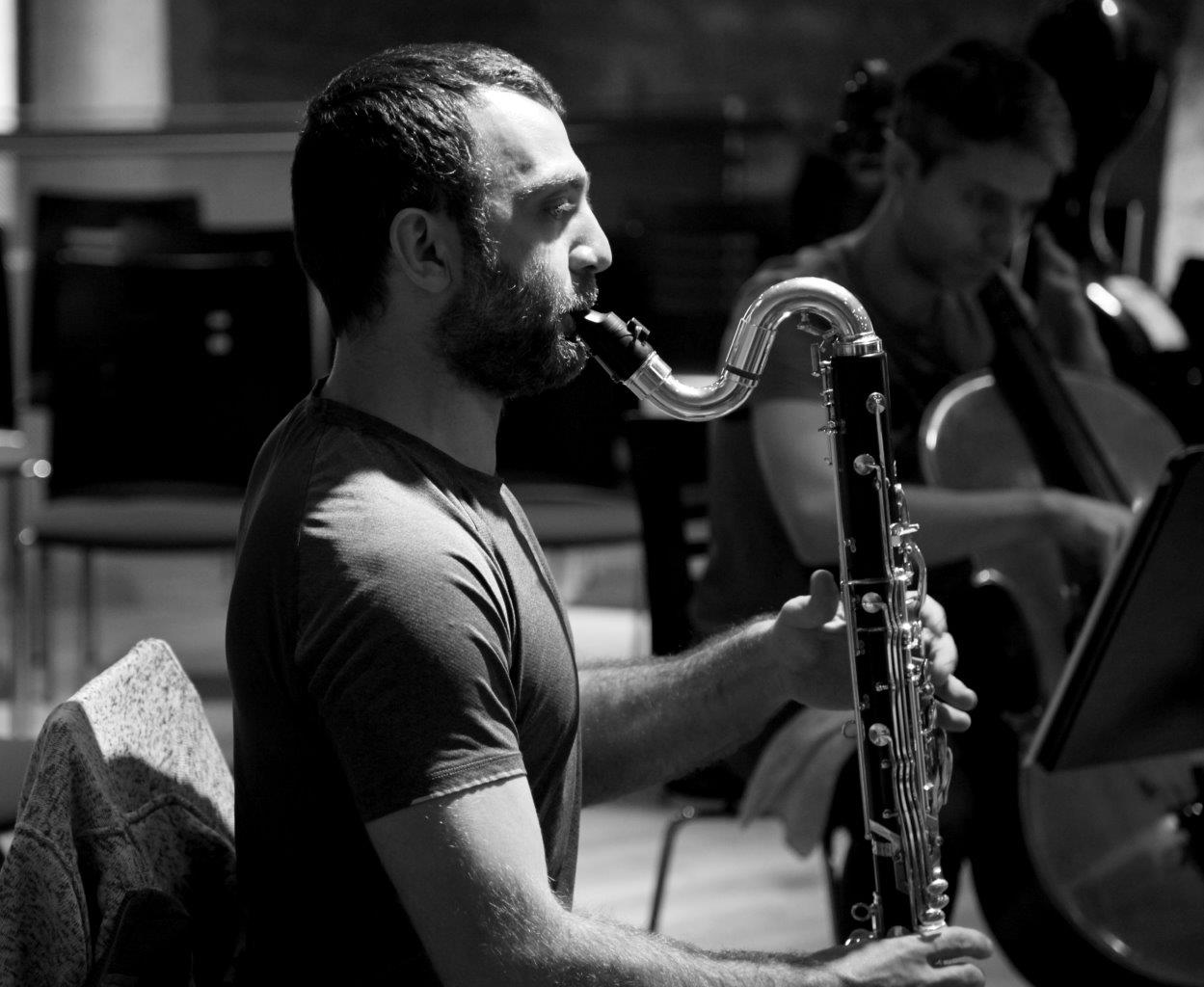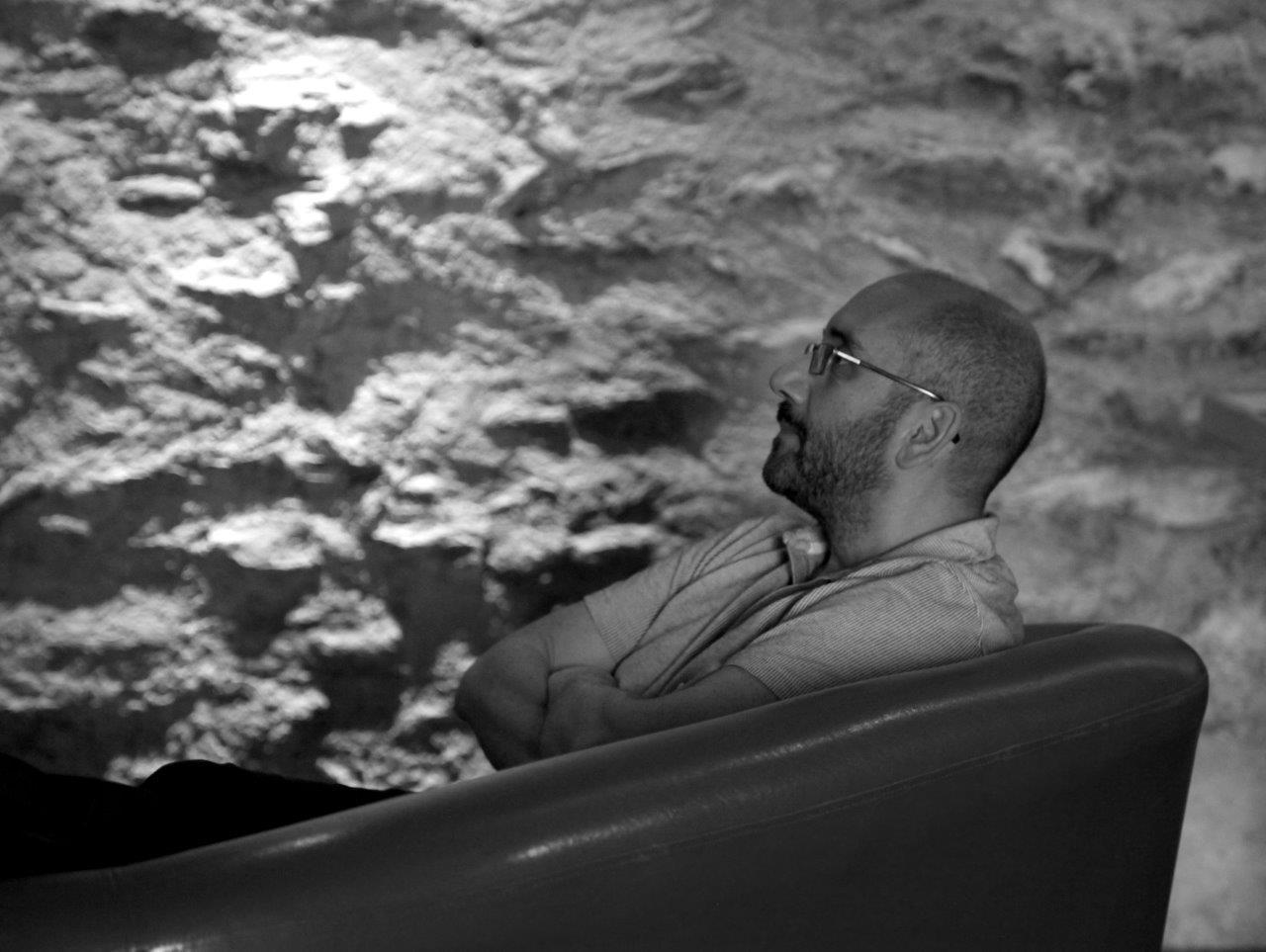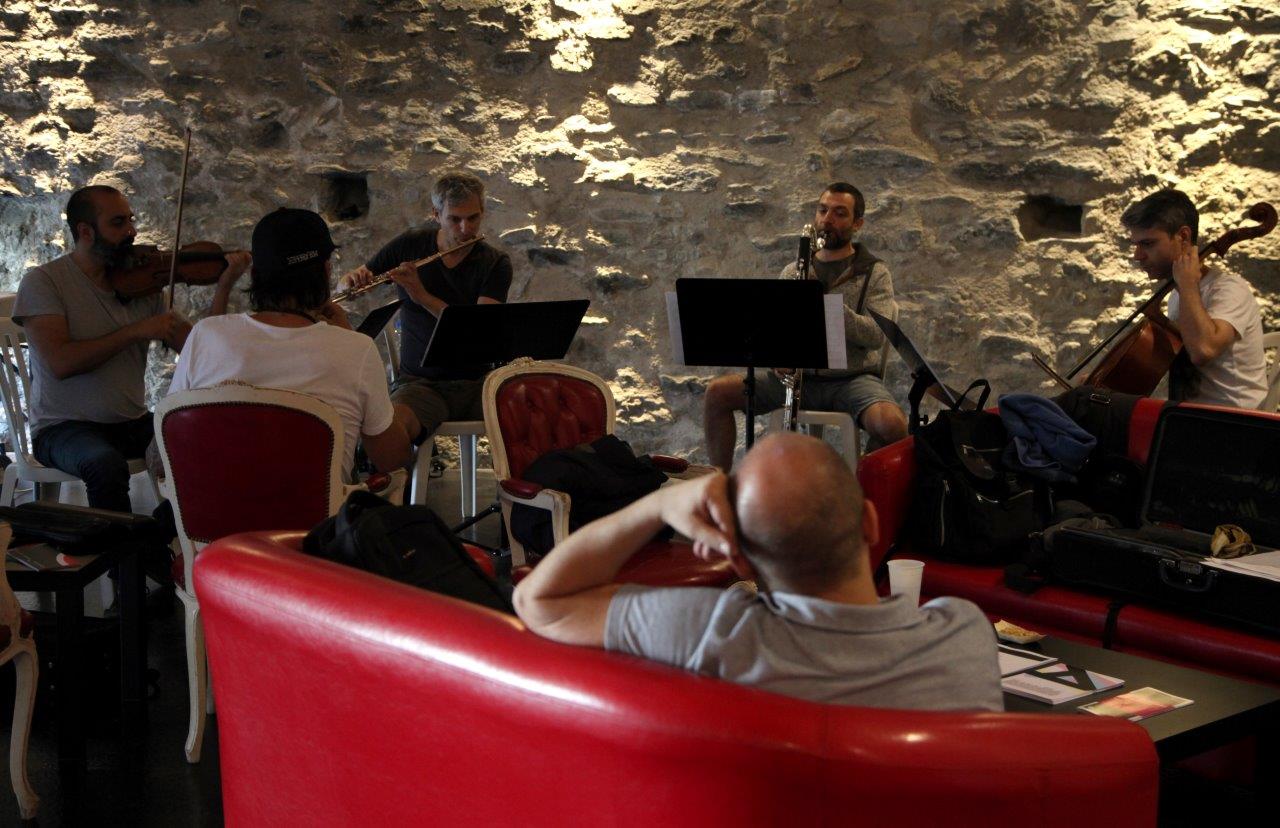|
2
JUNI 2017 - 19h00 - Schloss Leuk
(La Musique du Lieu) DISSONART ENSEMBLE (Thessaloniki)
DISSONART ENSEMBLE Theodoros Patsalidis The Thessaloniki-based ensemble dissonArt was founded in 2005 with the intention to disseminate the stylistic diversity of new music in Greece as well as internationally. Following the model of similar contemporary orchestral groups, the ensemble is organized around a core of 6 soloists and associated partners, with a flexible internal structure. The ensemble's programmes aim to promote works of recognized as well as emerging composers that deserve to be heard. Music-theatre works and collaborations with groups of other artistic disciplines that result in the creation of original works are among the main objectives of dissonArt. The ensemble has closely collaborated with composers such as G.Aperghis, B.Furrer and Manos Tsangaris (music theatre commision: Love & Diversity). dissonArt's activity spectrum includes, among others, educational projects such as the organization and realization of a bi-annual Composition Competition in collaboration with the State Orchestra of Thessaloniki, and Composition/Performance Workshops held at the Music Village-Pilion (www.music-village.gr). The ensemble has also performed at the annual Composition Workshop ( 2006-2011) organised by Thessaloniki Concert Hall. dissonArt ensemble is performing frequently in Greece and abroad in prominent halls and festivals such as the Darmstadt International Summer Course for New Music, Ensembl[:E]uropa (Cologne), Klang Festival (Copenhagen), Kunstfestspiele herrenhausen (Hannover), Forum Wallis (Switzerland), Milano incontra la Grecia (Milan), Klangspuren (Innsbruck ), 4020. mehr als Musik (Linz), Athens Festival, Brucknerhaus, Minoritensaal, Piccolo Teatro, Onassis Cultural Centre, Thessaloniki Concert Hall a.o. In 2012 their live concert in Cologne was released by WDR3 and Dissonance Records.
PROGRAMM Integrations kontextualisiert das Neue Musik-Ensemble anhand von spezifischen Improvisationskonzepten und Auftragswerken neu. An den Konzerten in Leuk beteiligen sich Le Pot, UMS 'n JIP der österreichische Komponist Wolfgang Mitterer sowie die Ensembles Taller Sonoro Sevilla und dissonArt Thessaloniki. Jedes der Integrations-Konzerte wird gemeinsam gestaltet, legt aber einen Fokus auf jeweils eines der Ensembles. 2 JUNI Pierre Mariétan (CH) 4 JUNI Daniel Fueter (CH) Max E. Keller (CH) UMS (CH) JIP (CH) MANUEL AÑON Denis Schuler (CH) Christophe Schiess (CH) UMS (CH) Beat Furrer (CH/A) JIP (CH) Georges Aperghis (GR) Haris Kittos (GR) 6 JUNI Christophe Schiess (CH) UMS (CH) Beat Furrer (CH/A) JIP (CH) Georges Aperghis (GR) Max E. Keller (CH)
MITWIRKENDE Ensemble
Taller Sonoro
Georges Aperghis. A Greek composer born in Athens in 1945, he has lived and worked in Paris since 1963. In 1971, after a few instrumental pieces more or less inspired by serial techniques, he composes his first musical play La tragique histoire du nécromancien Hiéronimo et de son miroir. This piece is at the root of much of his future investigations into the relationships between music and text, between music and stage. Thus, he takes part in the great adventure of musical theater that begun in France at the Festival d’Avignon. In 1976, with the founding of ATEM (Atelier Théâtre et Musique), he reinvents his approach to composition with a new art-form inspired by everyday life and social issues transposed into an often absurd and poetic world, in which musicians, singers, actors, and multimedia artists meet on a equal footing (La bouteille à la mer, 1976; Conversations, 1985; Sextuor, 1993; Commentaires, 1996) After leaving ATEM in 1997, he goes on writing musical plays (Machinations, 2000; Paysage sous surveillance, 2002; Le petit chaperon rouge, 2003; Luna Park, 2011). His concert music includes a large series of instrument or vocal solo pieces (among them is his masterpiece Récitations, 1978), introducing theatrical elements here and there, sometimes purely gestural. His chamber music, either orchestral, vocal, or instrumental, is rich of many pieces composed for a wide variety of performing ensembles. In these, he does not give up his taste for experimentation, nor for a certain kind of provocation (Die Wände haben Ohren, for large orchestra, 1972), but unlike musical theater, nothing is intentionally stage-oriented, all is composition-driven. His opera works, a third domain of activity, may be considered a synthesis of his musical theater and concert music; here, the text is the unifying and decisive element, and the singing voice is the main vector of expression. Georges Aperghis has composed seven lyrical works, including Pandemonium (1973) inspired by Jules Vernes’ writings, Liebestod (1981) after a letter from Brentano to Goethe, Tristes tropiques (1996) after Levi-Strauss, Les Boulingrin (2010) after Georges Courteline. Indeed, since the early 2000s, classifying Georges Aperghis’s works in three distinct domains is more confusing than ever because of their very nature. Die Hamletmaschine (2001), an oratorio based on Heiner Muller’s work; Dark Side (2004), a "monodrama" based on Aeschylus’ Oresteia; Avis de tempête (2004), an opera; perhaps even Wölfli Kantata (2006), a cantata after Adolf Wölfli’s writings; or Happiness Daily (2009), for soprano, mezzo-soprano and ensemble; all of them challenge the issues of drama, of performance, of staging, and they illustrate the freedom with which Georges Aperghis plays on classification and genre, in the performing arts as well as the theater. A prolific composer with a never-ending inventiveness, Georges Aperghis is building a very personal corpus of works, serious and humorous at the same time, rooted in tradition as well as free of institutional constraints. Knowledgeably opening up unexpected horizons of vitality and ease for his performers, he skillfully reconciles the sound and the visual, as much as he broaches issues embedded in the tragic or derisory aspects of his time. In October 2011, Georges Aperghis received the Mauricio Kagel’s Prize. http://www.aperghis.com/lire/bio.html#ENGshot
Haris Kittos was born in Thessaloniki, Greece, in 1971. In 1995 he graduated from the Macedonian Conservatoire, where he studied Solo Piano Performance, Harmony, Counterpoint, Fugue and Orchestration. Also, in 1997 he graduated from the School of Art, Aristotle University of Thessaloniki, obtaining BA (Hons) in Fine Art. In 1998 he moved to London, UK, and until 2000 he studied composition at Trinity College of Music at postgraduate level with Daryl Runswick and Andrew Lovett. Further study with Diana Burrell and full scholarship at the Guildhall School of Music and Drama led to MMus with distinction in 2001. Haris was also mentored by Theodore Antoniou, Susan Bradshaw, Alexander Goehr and Nye Parry. In 2008, fully funded by the AHRC and under the supervision of Julian Anderson, Dr Darla Crispin and Edwin Roxburgh, he concluded the DMus in composition at the Royal College of Music, where he has been lecturing since 2004. He also teaches composition at Purcell School since 2009. Haris has been a participant of the Blue Touch Paper scheme of the London Sinfonietta, under the mentorship of Georges Aperghis, the Composers Shortlist of Sound and Music, and New Voices of BMIC. His music has been performed throughout the UK and abroad by Arditti Quartet, Clariphonics, COMA, dissonArt, Ensemble Exposé, Ensemble In Extremis, London Sinfonietta, Jane Manning OBE, Sarah Nicolls, Smith Quartet, Solaris Quartet, Aleksander Szram, Nick Veliotis and others.
Christophe Schiess (*1974) a accompli sa scolarité à Reconvilier et à Bienne (maturité scientifique au Gymnase français). Enfant, il prend des cours de flûte à bec, de violon et de piano. Dans son adolescence, des musiciens tels que Martin Christ (composition) et Philippe Krüttli (Gymnase français de Bienne) lui donnent des impulsions déterminantes. En 1998, il reçoit le prix de composition de la commission de musique du canton de Berne pour sa pièce J'ai soif. Suite à des études d'agronomie et après avoir travaillé dans ce domaine, il entame en 2004 des études de pédagogie musicale et de direction chorale au conservatoire de Bâle. Il y travaille notamment la basse continue avec Rudolf Lutz, le chant avec Hans-Jürg Rickenbacher et la direction chorale avec Raphaël Immoos. Depuis 2007, il y étudie la théorie musicale (Roland Moser) et la composition (Georg Friedrich Haas). Il y obtient son Master of Arts en 2011. Depuis quelques années, il consacre toujours plus de temps à la composition - Depuis 2007, Christophe Schiess enseigne au Gymnase français de Bienne. Il a toujours affectionné le chant choral. En 2005 et 2006, il a dirigé le chœur mixte de Nidau, de 2007 à 2010 le chœur paroissial de Nussbaumen (Argovie). Il est à la direction du chœur de chambre Jubilate depuis le printemps 2010. Once estaciones, 11 Miniaturen für Blockflöten, Tenor/Countertenor und Violine (Solos, Duos, Trios). Die spanische Sprache schenkt uns diese Zweideutigkeit: Den Titel kann man sowohl als „11 Jahreszeiten“ wie auch als „11 Stationen“ verstehen. Die Folge der Jahreszeiten ist sowohl Zyklus wie Weg. Eine Spirale, wo das Identische nie ganz identisch ist, das Neue immer irgendwie schon geahnt. In den elf kurzen Momenten des Innehaltens geht es unter anderem um Leben und Vergänglichkeit, um Fortpflanzung der Steinböcke und Überdosis an Melatonin. Um Drei-, Zwei- und Einsamkeit. Christophe Schiess, Dez. 2013 http://www.christopheschiess.ch/
Just like his rich and non conventional path, Denis Schuler explores musical "territory". He draws material from such varied domains as traditional music, improvisation or the so called western classical music, confronting and combining multiple influences, allowing for his personal voice to emerge. Through thorough study of rhythm and sound material, his work investigates and approches the limits of hearing, particularly towards silence. The music proposed by Denis Schuler demands a specific kind of concentration where the ear often has to focus, catching breathes and noises and offering the audience the possibility of actively taking part in the listening process. His compositions were commissioned and created by the Orchestre de Chambre de Genève and ensembles such as the Vortex ensemble, Nederland Kamerkoor, Tetraflûtes, Le Concert Impromptu, Quatuor Bela, Ilôrkestra and Ensemble Vide. He was awarded many prizes and received the support of from the Swiss Musician Association (ASM), the Henneberger-Mercier Foundation, the Nicati-de Luze Foundation, the Patiño Foundation, the Foundation Suisa for Music, the Cultural Founds of the Swiss state, the Loterie Romande and from the Town and State of Geneva. He also created numerous musical compositions for theatre, the Schauspielhaus in Zurich, the Tojo in Bern, the Théâtre de Carouge, the Théâtre du Grütli in Geneva and composes for tv documentaries (Le jeu de la mort, broadcasted in march 2010 on the french public tv France 2). In addition, he performs as drummer and percussionist. He plays with bands from the new french scene such as the Fantazio Gang (Paris) and Frank Williams & the Ghost Dance (Paris). Until 2003 he also played with The Dead Brothers. He performs experimental music with people like Dorothea Schürch and Jean-Jacques Pedretti (from Zurich). Born in Geneva, Denis Schuler went on to study composition with Nicolas Bolens, Eric Gaudibert and Michael Jarrell. In 2005, he was awarded the Patiño Foundation scholarship, which enabled him to study at the Cité Internationale des Arts, Paris, under the direction of Emanuel Nunes (CNSMDP). In 2006 he graduated with honours after composing a concerto for percussion trio and orchestra. He was the first Swiss to be awarded the first prize at the International Composition Competition of Sacred Music, Fribourg, in 2008. Denis Schuler has been resident in the Swiss Institute Rome for the 2010-2011 academic year. His project included compositions and concerts organization, in partnership with composers, ensembles and musicians, among which the Ensemble vocal de Poche, the Ensemble vocal Séquence and the Ensemble Vide. He is also musical curator and proposes programs and ensembles for diverse structures as the Fondation suisse – Pavillon Le Corbusier in Paris, the Eternal Tour festival and the Ensemble Vide. This work leads him to think about the contents of concerts, the venues and the way the audience perceive the whole project. He favors programs that include unusual places for contemporary music and proposes original stage dispositions. These "sound-perception objects" allow the musicians to create a new relationship with the auditors, offering them new listening possibilities. http://www.schulerdenis.name/#biographie
Javier Hagen. Composer and singer born 1971 in Barcelona, raised between 6 languages in Wallis and the Mediterranean. Composition under the tutelage of Heiner Goebbels and Wolfgang Rihm. As a singer both tenor and countertenor, Javier Hagen is one of the most surprising classical singers of his generation. With an exceptional 4 octave vocal range, he has premiered more than 200 oeuvres at the most prestigious European contemporary music festivals collaborating with some of the most distinguished 20th century composers such as Aribert Reimann, Mauricio Kagel, Pierre Mariétan, Peter Eötvös and leading concrete poetry and constructive art artists such as Eugen Gomringer, Mauricio Rosenmann, Rolf Schroeter, Günther Uecker. Guest at festivals for new and early music in Donaueschingen, New York, Hong Kong, Strasbourg, Karlsruhe, Zurich, Lucerne, Geneva, Prague, Bologna, Milan, Amsterdam, Paris and Berlin. Numerous recordings for German, French, Czech and Swiss Radio and TV stations. Besides "standard" opera roles like Dardanus, Giulio Cesare, Zsupan and Pappacoda Javier Hagen premiered major roles in contemporary operas such as 'air à l'en verre' by Daniel Mouthon 1997, 'eismeer' by Christoph Schiller 2004, 'poem ohne held' by Regina Irman 2005, 'esther de racine' by Boris Yoffe 2006, 'Marienglas' by Beat Gysin 2010, 'Les Musiciens de Brème' by Wen Deqing 2011, 'Keyner Nit' by Mathias Steinauer 2011, 'Nothing and More' by Jack Fortner 2014, 'Ushba et Tetnuld' by Nicolas Vérin 2014. Prize winner of international new music and composition competitions in 2001/4/8 in Basel, Lausanne and Düsseldorf. 2003 publication of his ver-rückten Volkslieder "s´sch mr alles 1 Ding" by "musiques suisses" on CD. Hagen's compositional oeuvre includes the instrumental, scenical and vocal genres as well as electroacoustic and installative works. His vocal works receive particular appreciation and are performed at festivals all around Europe (Europa Cantat Mainz, Klagenfurt and Basel 2004/06/08, Centre Culturel Suisse Paris) as well as in Central America (America Cantat), Canada, China, Corea, Lituania, Israel and the U.S. Together with Ulrike Mayer-Spohn, Hagen forms the duo UMS ´N JIP, which is dedicated to new musical settings for recorder, voice and electronics, being one of the activest contemporary music ensembles worldwide. Jury member of national and international contemporary music and composition contests, among others Young Composers Award at the ISCM World Music Days 2014. Board member of both Swissfestivals Association and European Conference of Promoters of New Music ECPNM. He presides ISCM Switzerland and the Int. Society for Contemporary Music Valais/Switzerland IGNM-VS and is the director of Swiss contemporary music festival Forum Wallis. Lectures and masterclasses at the universities of Shanghai and Hong Kong, China. Calls for expertises for the Hochschule der Künste HdK Berne as well as for Valais Government (MusiquePRO) and UNESCO. In 2007 Hagen was nominated "Valaisan of the Year". 2013 he is awarded the "Prix Culturel du Canton du Valais".
Ulrike Mayer-Spohn. Extraordinary diversity describes the composer and multi-instrumentalist Ulrike Mayer-Spohn who plays the recorder (with focus on contemporary music), as well as historical string instruments (fiddle and baroque violin). She studied composition and audio design with Erik Oña at the Studio of Electronic Music, Academy of Music, Basel, beginning to compose in 2007, and receiving commissions from the festival forum Valais and the international New Music Days, Shanghai. Her work has been performed by the Stuttgart Vocal soloists, Ensemble Phoenix Basel, Vertigo, DissonArt, L'Arsenale, cool a cappella (1st Prize world choir games 2008) and her own ensemble Ums' n Jip in Switzerland, France, Greece, Italy, Russia, Australi , the USA and China, premiered under the baton of Beat Furrer, Mark Foster, Tsung Yeh, Jürg Henneberger and Filippo Perocco and broadcast by the Swiss radio. She was awarded the 2nd Prize in the composition competition Culturescapes 2010, 2nd Prize in the composition competition at the Bern music festival 2011, the Scholarship Award for 2011 at the Music Village Mount Pelion in Greece and the Call for Scores Award L'Arsenale Treviso, Italy 2011. With the ensemble Ums' n Jip she has undertaken research in the field of musical theater (chamber operas One, Two, Three, Four, Five), live electronic music and sound spacialization. She studied recorder with Ulrike Mauerhofer at the Musikhochschule Karlsruhe, with Conrad Steinmann and Corina Marti at the Schola Cantorum Basel before specializing in contemporary music and studying with Dorothea Winter at the Royal Conservatory in The Hague. From 2009-11 she received a specialized master in contemporary performance at the HSM in Basel supervised by Jürg Henneberger, Marcus Weiss and Mike Svoboda and has taken masterclasses with Marion Verbruggen, Peter van Heyghen, Sebastien Marq and Gerd Lünenbürger. She studied baroque violin and viola with Martina Graulich and David Plantier and fiddle with Randal Cook in Basel. Ulrike Mayer-Spohn works with internationally leading composers and annually plays more than 20 world premieres dedicated to her, which she has recorded for the radio as well as VDE Gallo on CD. Together with the Swiss composer and singer Javier Hagen, she established the experimental new music duo Ums `N Jip for voice, recorder and electronics, which, alongside Ensemble Modern, Intercontemporain and Kronos is one of the most active ensembles worldwide and in 2011 won the prestigious MusiquePro scholarship. Since 1999, Ulrike Mayer-Spohn has also performed as a recorder player, violinist, violist and fiddle player in specialized early music ensembles such as the Amsterdam Barok Compagnie, Freitagsakademie, Collegium Musicum Stuttgart, La Chapelle Ancienne, Musica Poetica, Muscadin and La Morra and has performed in Germany, China, the Netherlands, France, Spain, Italy and Switzerland.
Beat Furrer was born in Schaffhausen (Switzerland) in 1954 and received his first musical training on piano at the Music School there. After moving to Vienna in 1975, he studied conducting with Otmar Suitner and composition with Roman Haubenstock Ramati at the Hochschule für Musik und Darstellende Kunst. In 1985 he founded the Klangforum Wien, which he directed until 1992, and with which he is still associated as conductor. Commissioned by the Vienna State Opera, he composed his first opera Die Blinden. His second opera Narcissus was premiered in 1994 as part of the Festival “steirischer herbst” at the Graz Opera. In 1996 he was composer-in-residence at the Lucerne Festival. His music theatre work Begehren was premiered in Graz in 2001, the opera invocation in Zürich in 2003 and the sound theatre piece FAMA in Donaueschingen in 2005. In autumn 1991 Furrer became a full professor of composition at the Hochschule für Musik und Darstellende Kunst in Graz. He has been guest professor in composition at the Hochschule für Musik und Darstellende Kunst in Frankfurt 2006–2009. Together with violinist Ernst Kovacic he founded "impuls", a International Ensemble and Composers Academy for Contemporary Music. In 2004 he was awarded the Music Prize of the City of Vienna, and in 2005 became a member of the Academy of Arts in Berlin. He was awarded the Golden Lion at the Venice Biennale in 2006 for his work FAMA. In 2010 his music theatre Wüstenbuch was premiered in Basel. In 2014 he was awarded with Great Austrian State Prize. His latest opera La Bianca Notte based on texts by Dino Campana, was premiered in Hamburg in spring 2015. He is currently working on his new opera Violetter Schnee (Violet Snow) based on a Libretto by Vladimir Sorokin. Since the 1980s Beat Furrer has composed a wide range of works, from solo and ensemble music to orchestral and choral works and opera. He is well know for his nuanced exploration of the human voice and its relationship to instrumental sound. http://www.beatfurrer.com/biography.html
Max E. Keller was one of the first free jazz musicians in Switzerland. From 1966 until 1973 he followed his own concept performing free jazz and improvised music on the piano and electronic instruments in concerts or for radio recordings in Switzerland, Germany, Belgium, Poland and Czechoslovakia. Since 1973 Keller has produced over 90 compositions for various forces including electronic music. He often sets texts to music, examples include his ‘Gesänge II’ (Erich Fried); ‘Gesänge III’ (Jürg Weibel) and ‘Gesänge IV’ (Kurt Marti); ‘Konfigurationen’ (I, II and III – various authors); ‘Deformationen’ (self-written texts); the feature-length cantata ‘Fontamara’ (Ignazio Silone), the mini-opera ‘Egon – aus dem Leben eines Bankbeamten’ (Hans Suter) and the chamber opera ‘Die Axt’ after Max Frisch’s ‘Graf Öderland’ (2004-2006), a commission for the Komischen Oper Berlin. Performances and radio broadcasts in the whole of Europe, Australia, North and South America, Russia, Mongolia, Korea and Azerbaijan are a part of his career history. Keller began improvising again after 1985 and since 1985 is responsible for the programme and organisation of contemporary music and jazz concerts at the ‘Theater am Gleis’ in Winterthur. 1985 - Swiss representative at the biennale in Berlin, 1991 - Swiss representative at the IGNM Weltmusiktagen in Zurich, 1993 - Swiss representative in Mexico, 1997 - Art prize of the Carl-Heinrich-Ernst-Foundation in Winterthur, 1999 - Berlin stipend, 2001 - Project contribution (commission from the Tonhalle-Orchester Zürich), 2003 - Contribution to the artistic work of the Aargauer Kuratorium. ‘Sicher sein ...’ (speaker and electronic tape) and ‘Repetitionen I-V’ (harpsichord) were recorded onto LP and ‘Pentalog’ (orchestra) and ‘Sie’ (speaker and electronic tape) onto CD; two CDs (col legno and Jecklin Edition) are dedicated solely to his chamber musical works, a third CD (Grammont-Portrait) containing five chamber musical works and one orchestral work (Tonhalle-Orchester conducted by David Zinman) was released in 2003. Mit dem Formprozess von Mobile erinnere ich mich an meine Anfänge, als ich allmählich vom Improvisieren zum Komponieren kam, indem ich verschiedene Wege suchte, die Improvisation formal zu gestalten. In Mobile spielt jedes Instrument in freier Reihenfolge die ihm zusagenden Elemente. Alle haben die gleichen 25 Elemente zur Verfügung, die allerdings sehr unterschiedlich sind, sei es in der Länge, sei es in der Determinierung: von völlig ausnotierten Teilen bis zur Repetition einer Phrase, deren Tonhöhen nur approximativ und deren Dynamik nur als Bandbreite notiert sind; von graphisch notierten Teilen über verbal beschriebenen Strukturen bis zur blossen Anweisung "Kontrastiere einen Mitspieler!"; von einer vollständig ausnotierten gesungenen Passage über einen blossen Rhythmus bis zu einem gesprochenen Text. Die gesellschaftliche Kehrseite solch freier Wahl unterschiedlichster Elemente (auch Instrumente) ist Beliebigkeit und Nivellierung bis zur Orientierungslosigkeit. Typischer Ausdruck davon ist das Internet: eine uferlose Menge von Informationen überschwemmen uns und erscheint unterschiedslos auf ein und derselben Ebene: Wichtiges neben Unwichtigem, Richtiges neben Unrichtigem, Sachliches neben ideologisch Gefärbtem, Wissenschaft neben Werbung...ein vollendeter Ausdruck postmoderner Beliebigkeit. Die gesprochenen oder gesungenen Texte drücken dies explizierter aus, indem sich neben einer Sensationsmeldung ein Detail des Versicherungsrechtes findet, neben einem Grenzzwischenfall ein Plan zur Rettung aus der Finanzkrise steht oder neben einer Parole/Losung der amerikanischen Waffenlobby ein Eichendorff-Gedicht.
|
|

